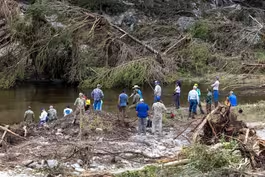
Flint removes thousands of lead pipes, but problems remain
Clip: 7/20/2025 | 5m 21sVideo has Closed Captions
Flint removes thousands of lead pipes in major milestone, but these problems remain
It’s been more than a decade since the alarm was sounded about high levels of lead in Flint, Michigan’s tap water. This July, the city said it had completed the work of replacing as many as 11,000 lead pipes mandated by a 2017 settlement. But lead lines still remain in Flint and states across the country. Ali Rogin speaks with Erik Olson of the Natural Resources Defense Council for more.
Problems playing video? | Closed Captioning Feedback
Problems playing video? | Closed Captioning Feedback
Major corporate funding for the PBS News Hour is provided by BDO, BNSF, Consumer Cellular, American Cruise Lines, and Raymond James. Funding for the PBS NewsHour Weekend is provided by...

Flint removes thousands of lead pipes, but problems remain
Clip: 7/20/2025 | 5m 21sVideo has Closed Captions
It’s been more than a decade since the alarm was sounded about high levels of lead in Flint, Michigan’s tap water. This July, the city said it had completed the work of replacing as many as 11,000 lead pipes mandated by a 2017 settlement. But lead lines still remain in Flint and states across the country. Ali Rogin speaks with Erik Olson of the Natural Resources Defense Council for more.
Problems playing video? | Closed Captioning Feedback
How to Watch PBS News Hour
PBS News Hour is available to stream on pbs.org and the free PBS App, available on iPhone, Apple TV, Android TV, Android smartphones, Amazon Fire TV, Amazon Fire Tablet, Roku, Samsung Smart TV, and Vizio.
Providing Support for PBS.org
Learn Moreabout PBS online sponsorshipJOHN YANG: It's been more than a decade since the alarm was sounded about high levels of lead in Flint, Michigan's tap water.
This month the city said it had completed the work of replacing as many as 11,000 lead pipes as mandated by a 2017 court approved settlement.
But lead lines still remain in Flint and in states across the country.
Ali Rogin spoke with Erik Olson of the Natural Resources Defense Council, which was one of the driving forces behind the settlement.
ALI ROGIN: Thank you for being here.
How do we know that the city of Flint has Indeed replaced all 11,000 of these pipes that they said they would as a result of that 2017 settlement?
ERIK OLSON, Natural Resources Defense Council: Well, we've had to go back to court now six times and constantly been tracking to see if the city was actually following through on this settlement agreement.
Finally, the court actually held the city in contempt and the state took over most of the finishing up of this project.
So we believe that the vast majority of the pipes have been pulled out and most of the restorations have been done.
But there still are some pipes, but we do think they're mostly done.
And this is just a really big milestone in protecting the citizens of Flint.
ALI ROGIN: And to that end, major milestones certainly.
But as you mentioned, there are still more pipes that are down there and there's still a lot of deep distrust among the residents of Flint.
I want to play for you a sound bite from Flint resident and water activist Melissa Mayes talking about those dangerous pipes that are still in the ground in Flint.
MELISSA MAYS, Flint Resident: We just celebrated the end of a 10-year process of getting the lead service lines out of the ground.
And then a few days later we found out that the City had uncovered 3,200 addresses they had skipped previously.
So now we know that there's still lead in the ground.
We are all still using bottled water to brush our teeth, to drink, to cook with, to give our pets, because we've had too many pets die.
ALI ROGIN: How were those additional pipes missed?
ERIK OLSON: It's a very good question how the city was unable to identify those locations.
So that's something certainly we're going to be following up on.
Obviously, the vast majority of the pipes were replaced, but the fact that there are literally a few thousand, the addresses were overlooked somehow gives us real concern.
So we're certainly celebrating the people power that created this settlement, but obviously there's still some work to be done.
ALI ROGIN: It took more than a decade for this to happen, and yet in many cities, there are still lots of lead pipes carrying water to people's homes.
How widespread is this problem?
ERIK OLSON: Unfortunately, a lot of people think that this problem was limited to Flint and maybe a few other big cities in the Northeast.
But we did a survey, and now EPA is done an evaluation.
It looks like there are about 9 million of these lead pipes.
They're in all 50 states.
They serve tens of millions of people with their water.
It's basically like drinking out of a lead straw.
So the last administration took the initiative and said, we're going to get rid of all these lead pipes across the country in 10 years.
And we're now awaiting whether the current Trump administration is going to honor that commitment and pull out all those lead pipes in 10 years.
ALI ROGIN: How concerned are you that the Trump administration may not uphold this requirement that the Biden administration put in place?
ERIK OLSON: We're very concerned that the Trump administration may try to pull back on this commitment.
It's something that they haven't yet really said anything publicly about what their plans are.
The bad news is that they pulled back on some of the other drinking water standards, like the standards forever toxic chemicals that they've announced they're going to repeal some of those standards.
We're hoping that they decide that lead is something that nobody wants in their drinking water and they're going to let the commitment stand to pull out those lead pipes in the next decade.
But wait and see.
ALI ROGIN: And we know that children in Flint were some of the most deeply affected.
What's your understanding of how the children of Flint, Michigan, who really bore the brunt of this crisis, how are they doing now?
That entire generation of children, a lot.
ERIK OLSON: Of kids were hungry, harmed by the excessive levels of lead in their drinking water.
It can harm development of their brains.
It can have lifelong impacts.
So, there are some special resources that have been made available to kids in Flint to help them do as much recovery as possible.
Special education assistance.
Michigan State University has a pediatric unit that is helping kids there.
But there's still a lot of work to do for the children there.
And a lot of people don't realize this, but lead also can be quite dangerous for adults.
It actually can cause problems of heart disease and even fatal heart attacks, which is why it's super important to get rid of these lead pipes, certainly for the children, but adults are affected too.
ALI ROGIN: That's a really good point.
Erik Olson with the Natural Resources Defense Council, thank you so much for joining us.
ERIK OLSON: Thanks so much for having me.
Malaysia stops accepting plastic waste from rich nations
Video has Closed Captions
Clip: 7/20/2025 | 4m 27s | Malaysia stops accepting plastic waste from the U.S. and other rich nations (4m 27s)
News Wrap: Number of missing from Texas floods drops to 3
Video has Closed Captions
Clip: 7/20/2025 | 2m 26s | News Wrap: Number of missing from Texas floods drops to 3 people (2m 26s)
Palestinians describe risking death to get food aid in Gaza
Video has Closed Captions
Clip: 7/20/2025 | 6m 23s | Palestinians describe choice between starvation and risking death to get food aid in Gaza (6m 23s)
What to know about mental health misinformation online
Video has Closed Captions
Clip: 7/20/2025 | 4m 51s | What to know about the rise of mental health misinformation on social media (4m 51s)
Providing Support for PBS.org
Learn Moreabout PBS online sponsorshipSupport for PBS provided by:
Major corporate funding for the PBS News Hour is provided by BDO, BNSF, Consumer Cellular, American Cruise Lines, and Raymond James. Funding for the PBS NewsHour Weekend is provided by...















